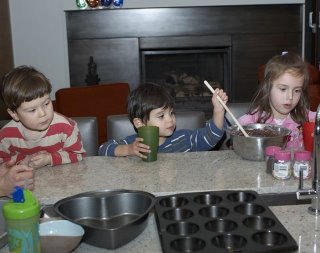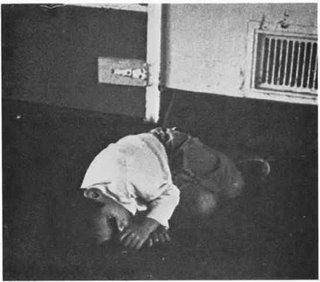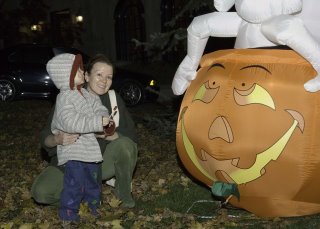Autistic Adam
So often, parents of very young autistic children assume that they don’t know what’s going on around them – that they are confused. Surely, a disorienting procedure and environment would have one believe that this would be more so when Adam was in the recovery room. But I’ll never forget how he calmed down as soon as I said we were going home. Grandma was waiting in the hallway with a balloon which he gladly took.
When we brought him home, I put him in our king-sized bed so I could lie with him, and I did all day. I would not leave my son for an instant while any anesthetic was still wandering through his bloodstream. Seeing my little guy otherwise so lively and endlessly moving, now still and quiet, was scary. When eight hours had passed, and he wanted to eat, when his eyes became alive again, I was relieved. Adam and his autism were back. The world was right again.
Then, he needed dental surgery for overly soft teeth that were already decaying despite all the attempts to clean them. Nothing stopped me from doing the exact same thing, except this time, I spent days before calling the hospital to advocate for him and to get me into recovery before he woke up. I asked for a sedative before anesthesia so he wouldn’t have a melt-down (he now was warry of hospital staff doing anything to him). I asked well in advance that I administer the sedative myself (otherwise he would not have received a sedative at all). I knew just the right way to get him to swallow it without spitting it up, without fighting. I advocated to get suited up to accompany him to surgery and to hold him while he was given anesthesia. And, this time, I was there when he woke up. I knew just what songs to sing when he woke, how to orient him enough to let him know that I was there and everything was going to be okay. This time, he got a private room to recover in. He didn't cry. I know that Adam trusts me. He will run to me first whenever he is scarred or ill.
This is a rite of passage for a parent of an autistic child: learning how to advocate in a way that does not discriminate the child, but instead advocates for the child’s need in a way that others can understand and respect. I don’t just say Adam is autistic as it tends to mean nothing, or leads to a perception where doctors will raise their voices and treat him as a behaviour rather than with sensitivity. I explain the particulars, our experiences and our successes. I can tell you with certainty, it is extremely worthwhile.
I’ve decided to write this section because it occurred to me that doctors, illness has been a major part of our lives since Adam was born – when he was a year old, he had his first terrible ear infection in Florida and went on intravenous. This was my first horrible experience – Adam was so ill for days with a huge fever. Adam was sleeping day in and day out and family was telling me not to worry until I finally put my foot down and said that I was heading for the hospital, and it was a good thing I did. Coming from a family where there are ten grandchildren, people in my family thought they knew everything about parenting and taking care of children, for good reason. But I quickly learned that they did not know about Adam, about his idiosyncracies, and my instinct was always right on.
I think this first experience for Adam was the beginning in traumatic sensory overloads and just general fear: bright lights, hospital staff holding him down while I tried to console him by singing in his ear. I cringe as I write this…there is nothing you can do when your very young child needs intravenous or blood tests. I can still feel so helpless and all I can do is offer my presence, my voice, and my hugs. As we grow up together, Adam and I, we are getting a little smarter about the advocacy part.
The last two days, I have been by Adam’s side as he fights the croup again. It happened last year – another first experience with it -- he couldn’t breathe once we got to the doctor’s office so they had to give him an oxygen mask. He was terrified at that mask. With the hands or myself, my mother, the nurse, we all got Adam to sit still enough to take the mask. When we reach the doctor’s office, he hates it and wants to turn around. Today was no different. I said the “doctor will make you better.” He cooperated but not without Henry’s assistance as his ears had to be checked again. But I did notice for the first time today, he began to calm down during examination, where he used to fight a whole lot more. He is growing up, my guy. He is learning that the ear examination will not hurt. It wasn’t something anyone else in the room noticed but me.
So he suffers again today as he watches Elmo in Grouchland, only half-there, nearly ready to drift off to sleep, so his little body can fight some more. He probably hates the movie, but he doesn’t care. A healthy autistic Adam would fight for another video – he would open the drawer, grab the one he wants and give it to me. Or, he might say ABC, meaning that he wants an ABC video. You see, when Adam is sick, I always want my autistic Adam back. He is alive, full of vigor, curiosity. How anyone can say autism is like cancer baffles me, if not angers me. How can ANYONE compare autism to cancer?!! As Adam lies beside me as I write this and struggles for air, I bet any parent who is on the brink of losing a child would trade it in for autism any day.
I couldn't be prouder of my son, more in love with any child. It is always natural to wonder what could have been without autism. But autism is here and I don't mind a bit. I mind the stigma. That part of autism and disabiltiy is the heart-breaking part. Here is Adam recently (on the left) with his facilitated play group in my home, baking muffins...in a healthier state. This is what life is supposed to be like, right? I guess autism isn't that remarkable afterall.


"Having failed to distinguish thoughts from things, we then fail to distinguish words from thoughts. We think that if we can label a thing we have understood it."
-Maha Sthavira Sangharakshita


































